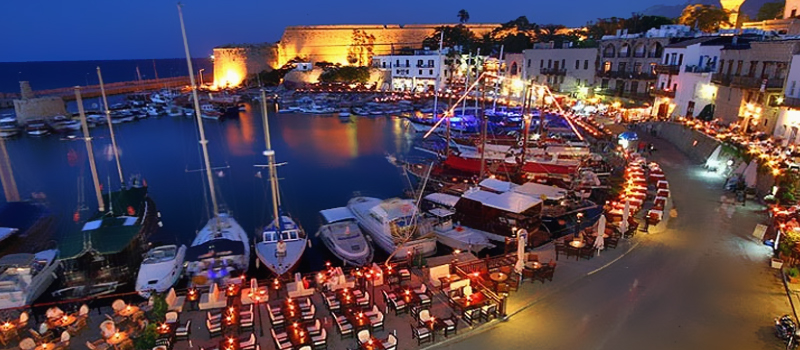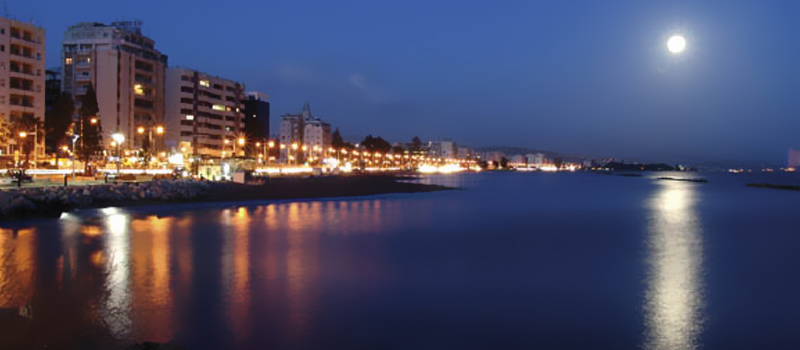About Cyprus
Cyprus has a history that dates backs thousands of years. It is the Largest and most cosmopolitan island in the Eastern Mediterranean. The Republic of Cyprus joined the European Union in 2004 and the Euro zone in 2008. Cyprus is connected with most European capitals on a daily basis by air and residents enjoy one of the highest standards of living amongst European states in issues regarding crime rates, education, economy and lifestyle.
The fact that it is the birthplace of Aphrodite, the Greek Goddess of 'beauty' and 'love' herself, is no coincidence; the natural beauty is stunning. Being surrounded by a coastal lace with crystal clear waters, smooth sandy beaches, green valleys, picturesque mountain villages and with a warm Mediterranean climate with 330 days of sunshine, makes Cyprus a dream destination where visitors can enjoy swimming and water-sports throughout the year.
Cyprus was the meeting point of great civilizations due to its strategic location. In its 9,000 years of recorded history, the culture of the islands has been shaped by its conquerors; ancient Greek sanctuaries, Roman temples and medieval castles, reveal the rich history of the island. Ten of the numerous Byzantine frescoes-painted churches have been inscribed on the UNESCO heritage list, along with other archaeological monuments. All these influences blend harmonically with the modern cosmopolitan Cyprus of today.
In Cyprus there is much to enjoy, see and do. It is a whole world condensed in a small area.
Where is Cyprus
Cyprus is an island nation on the cross-roads of three continents. It is located in the Eastern Mediterranean. The strategic location of the island is ideal for traveling to Europe, Asia, Gulf Region and Africa.
Why Cyprus?
Leisure and Lifestyle
A tourist destination for millions, Cyprus offers activities such as horse riding, mountain climbing, swimming and bathing at one of the many blue flag beaches, sailing, skiing, snowboarding, hiking and nature exploring amongst others. Cypriots are unusually friendly to foreigners and very welcoming thus; do not be surprised if they invite you to their home for coffee.
Tourism
Cyprus is a popular holiday destination. Its tourism infrastructure is ranked 5th in the world by the World Tourism Organization and attracted more than 2.7 million tourists in 2015. Cyprus has a Mediterranean climate with warm summers and mild winters with 330 days of sunshine. In addition, Cyprus has been awarded with 57 blue flag beaches by the Foundation of Environmental Education topping all countries in Europe for 10 consecutive years. Rich natural resorts such as the Troodos Mountain provides for snowboarding and skiing during the winter months and the Larnaca Salt Lake where tens of thousands flamingoes visit the lake each year is ideal for bird viewing and strolling.
In addition, there is much to explore with more than 9,000 years of History and numerous UNESCO World Heritage Sites – Roman Temples, Byzantine Churches and Medieval Castles are located in Cyprus. Larnaca ('Citium' as it was founded) is featured as one of the oldest cities in the world by researchers.
Standard of Living
Cyprus enjoys a very high standard of living $30,881 (GDP per capita PPP) per the International Monetary Fund as estimated in 2014. Also, Cyprus is ranked 5th for best relocation destination in the world by the International lifestyle review (Knight Frank Global Lifestyle review 2013), the only European state to make it into the top five along with Switzerland. Cyprus was ranked highly because of its business and leisure benefits and a favorable tax regime, particularly towards entrepreneurs.
Moreover, a study conducted by ValuePenguin in 2015 ranked Cyprus 1st as safest small country to live in the world with population less than 5 million and 5th out of all 107 countries in the study. Cyprus enjoys low air and noise pollution and first class medical health care with excellent private and public hospitals.
Education
State education in Cyprus is free and the country was ranked 3rd in 2011 amongst European states for expenditure on education as a percentage of GDP (7.9%) according to Eurostat, surpassing countries such as Norway, Switzerland, USA and the UK. The private sector's expenditure on education as a percentage of GDP was ranked 1st in Europe by Eurostat.
Furthermore, Cyprus has English speaking private schools and Universities while UK Universities have set up campuses in Cyprus and offer UK University courses. The Cyprus state University (University of Cyprus) was ranked 351st in the world by the World University Rankings published by the Times Newspaper.
Professional Services and Workforce
A very high education index has contributed in developing Cyprus' labour pool into a very skilled workforce which provides high quality services and excellent business opportunities, factors which lead Cyprus in evolving as an economic hub and a trade centre in the region.
Strong Legal System and Reliable Land Registry
Cyprus is a member of the Commonwealth and ex-British colony. The legal justice system is based on the common law principles and is similar with India and the UK. Indeed Cyprus contract law is closer to India than the UK. The Land Registry provides security and reliability to all property buyers. A title deed holder is the sole legal owner and freeholder of property.
Tax
Cyprus has the lowest corporate tax in Europe 12,5% and no inheritance tax. It is no coincidence that Cyprus has attracted a lot of international companies to relocate in the island because of its favorable tax system towards entrepreneurs and businesses. Double tax agreements have been signed with more than 40 countries including Russia, China, USA, Qatar and Iran.
Energy
Hydrocarbons reserves have been discovered off the South coast of the island. Already there is a process underway by oil and gas giants Noble (USA), ENI (Italy), KOGAS (S. Korea) and British Gas Group (UK) to exploit the reserves. Cyprus is an emerging energy hub for the Eastern Mediterranean region.
Strategic Location
The strategic location of the island and proximity to three continents is ideal. Cyprus is served by two modern International Airports which accommodate travelling to and from Europe, Asia – Middle East and Africa while the ports offer trips to the Greek islands, Lebanon, Egypt, Israel and many more.
International Relations
Cyprus is a full member of the European Union since 2004 which grants access to the EU market of more than 500 million citizens. Combined with Cyprus' adoption of the Euro € in 2008, this led to the lifting of property and trade restrictions, an increase to financial attractions as well as greater business investments.
Most notably Cyprus is, also, a member of the United Nations, the World Bank, the International Monetary Fund, World Health Organization, the Commonwealth and the Council of Europe.
Cyprus enjoys excellent relations and economic ties with Europe, the Middle East and Gulf Countries as well as major economies such as Russia, China, India and the USA.
Cyprus enjoys free movement as a member state of the EU. The Cypriot passport was ranked 9th in the world by the Passport Index rating and allows you to travel to more than 176 countries and territories around the globe VISA free or upon arrival.




